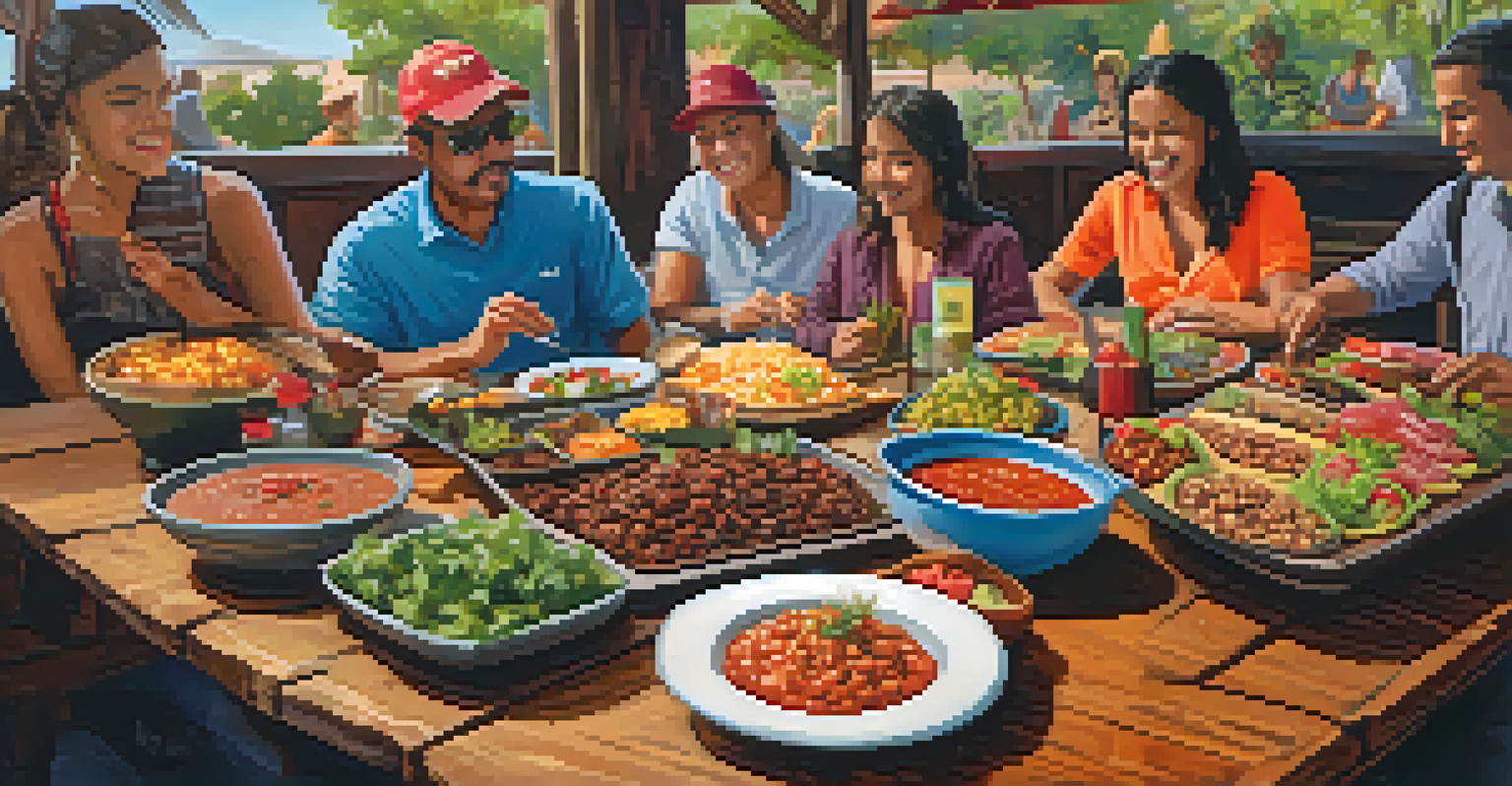How Guided Tours Enhance Your Culinary Tourism Experience

What Is Culinary Tourism and Why It Matters?
Culinary tourism is all about exploring a region's culture through its food. It’s more than just eating; it’s about experiencing the stories, traditions, and ingredients that make each dish unique. As global food lovers seek authentic experiences, culinary tourism has gained popularity, offering travelers a deeper connection to their destinations.
Food is our common ground, a universal experience.
Imagine walking through a bustling market, the scents of spices filling the air, and the chatter of locals creating a vibrant atmosphere. This is the essence of culinary tourism—immersing yourself in flavors that tell a story. Guided tours enhance this experience by providing insights and context that you might miss on your own.
By participating in a guided culinary tour, you’re not just tasting food; you’re learning about its origins and the people behind it. This enriches your understanding of the local culture and transforms a simple meal into a memorable experience.
Expert Guidance: The Key to Authentic Experiences
One of the biggest advantages of guided culinary tours is the expertise of your guide. These individuals are often local chefs, food critics, or passionate foodies with deep knowledge of the region's culinary landscape. Their insights can turn an ordinary meal into an extraordinary one.

For example, a knowledgeable guide might take you to hidden gems that aren’t listed in tourist brochures. These authentic spots often serve the best local dishes, allowing you to savor flavors that truly represent the area. This insider access can make all the difference in your culinary journey.
Culinary Tourism Connects Cultures
Culinary tourism allows travelers to explore a region's culture through its food, providing a deeper connection to their destinations.
Additionally, a guide can explain the cultural significance of certain dishes, helping you appreciate them on a deeper level. This wealth of knowledge transforms your dining experience from mere consumption to cultural immersion.
Social Connections: Sharing Food with Others
Food has an incredible way of bringing people together, and guided tours amplify this effect. When you join a culinary tour, you’re often surrounded by fellow food enthusiasts who share your passion. This creates an instant bond as you explore new flavors together.
Traveling opens your heart, broadens your mind, and fills your life with stories to tell.
Sharing a meal with others not only enhances your enjoyment but also opens up opportunities for conversation and connection. You might find yourself swapping stories, sharing tips on favorite dishes, or even forging lasting friendships with fellow travelers.
These social connections enrich your culinary tourism experience, making it more memorable and enjoyable. The laughter and camaraderie you share over a delicious meal often become the highlights of your trip.
Hands-On Experiences: Cooking Classes and More
Guided culinary tours often include hands-on experiences, such as cooking classes or food workshops. These activities allow you to roll up your sleeves and learn how to prepare local dishes yourself. Not only is this a fun way to engage with the culture, but it also provides you with skills you can take home.
Imagine learning to make fresh pasta from a local chef in Italy or mastering the art of sushi rolling in Japan. These interactive experiences deepen your appreciation for the cuisine and make for great stories to share back home.
Guided Tours Enhance Food Experiences
Expert guides elevate culinary excursions by revealing hidden gems and sharing cultural insights, transforming ordinary meals into extraordinary experiences.
Plus, you get to enjoy the fruits of your labor! The satisfaction of sharing a meal you’ve created with others is an unforgettable highlight of culinary tourism.
Savoring the Flavors: Tasting Tours and Sampling
Guided culinary tours often include tastings at various restaurants, markets, and food stalls, allowing you to sample a wide array of local delicacies. This is a fantastic way to experience the diversity of a region’s cuisine in one trip. Each stop on the tour offers a unique flavor profile, showcasing the area’s culinary richness.
Imagine embarking on a food tour in Mexico City, where you taste street tacos at one stand, followed by a rich mole dish at another. These tasting experiences are curated to give you a comprehensive overview of the local food scene, ensuring you don't miss out on iconic dishes.
Not only do you get to enjoy delicious food, but these tastings often come with stories about their history and preparation, making each bite even more meaningful.
Cultural Insights: Learning Beyond the Plate
Culinary tours are not just about what’s on your plate; they also offer insights into the culture, history, and traditions that shape the food you’re enjoying. Your guide can share fascinating stories about local customs, festivals, and the significance of certain ingredients, providing a richer context for your meal.
For instance, you might learn about the traditional rituals surrounding a specific dish or how historical events have influenced local cuisine. This depth of knowledge can enhance your appreciation for the food and the people who prepare it.
Support Local Through Food Choices
Participating in guided culinary tours promotes sustainability and supports local communities by prioritizing farm-to-table practices and local artisans.
Understanding the cultural background behind a dish allows you to connect with it on a personal level, making your culinary experience all the more rewarding.
Sustainable Practices: Supporting Local Communities
Many guided culinary tours prioritize sustainability and support local farmers and artisans. By choosing to eat at local establishments and using seasonal ingredients, these tours contribute to the local economy and promote sustainable practices. This means your culinary adventure not only satisfies your taste buds but also benefits the community you’re visiting.
When you dine at a farm-to-table restaurant or participate in a cooking class that uses locally sourced ingredients, you’re engaging in a responsible form of tourism. This connection to the community fosters a sense of responsibility and respect for the environment.

Supporting local businesses enriches your travel experience while ensuring that the culinary traditions you’re enjoying can thrive for future generations.